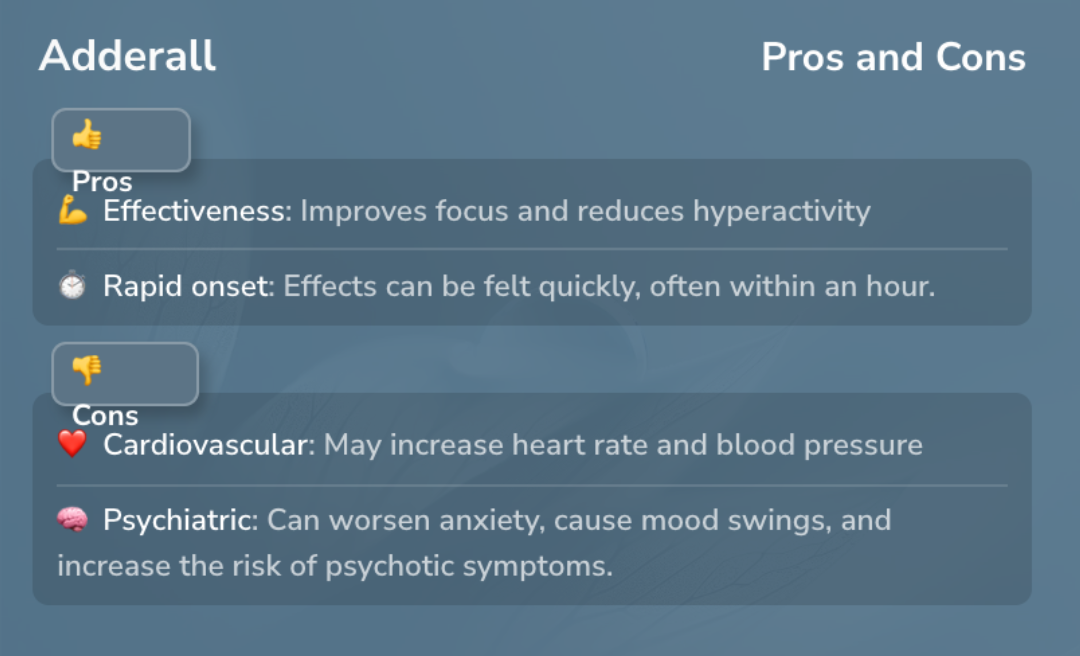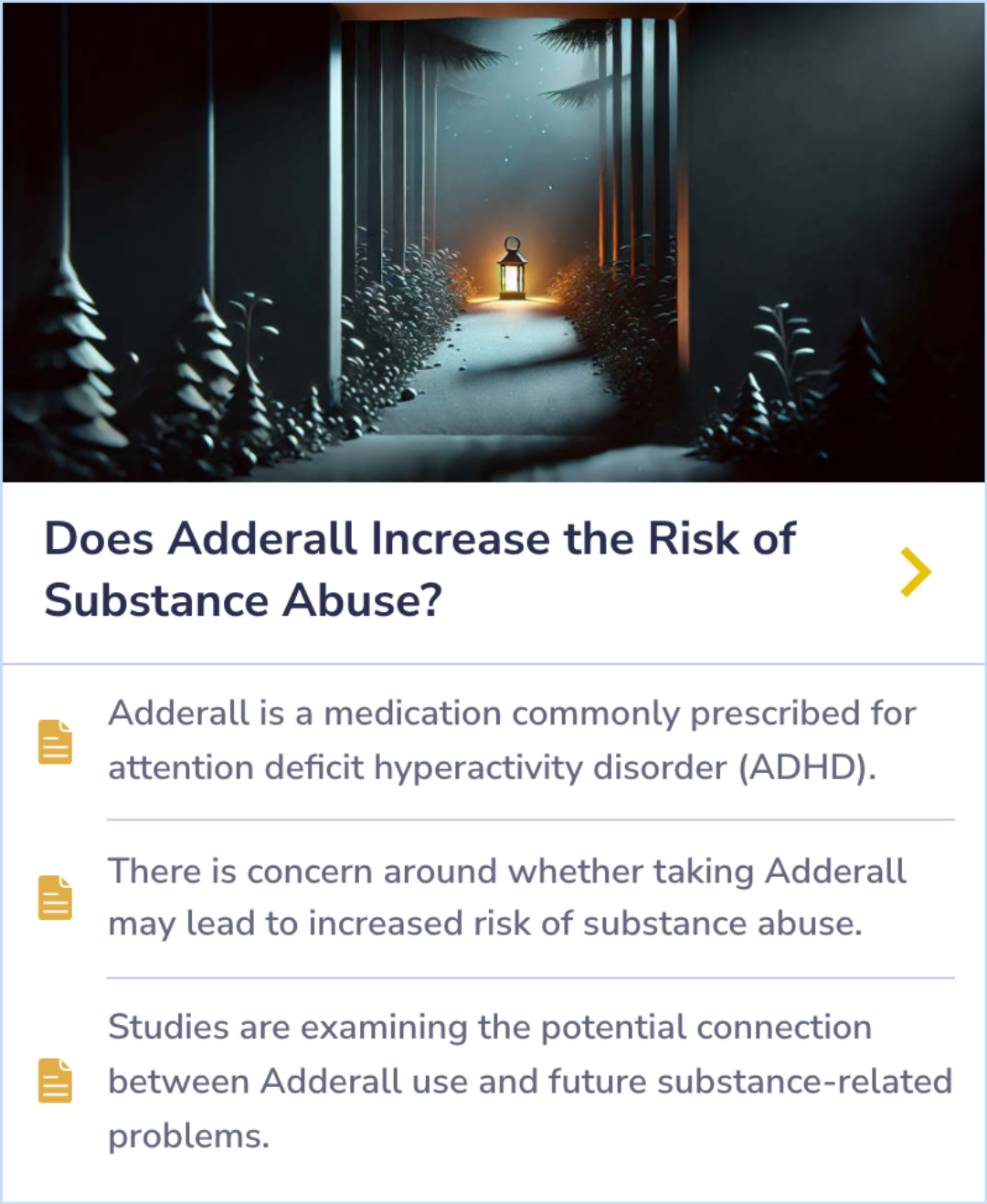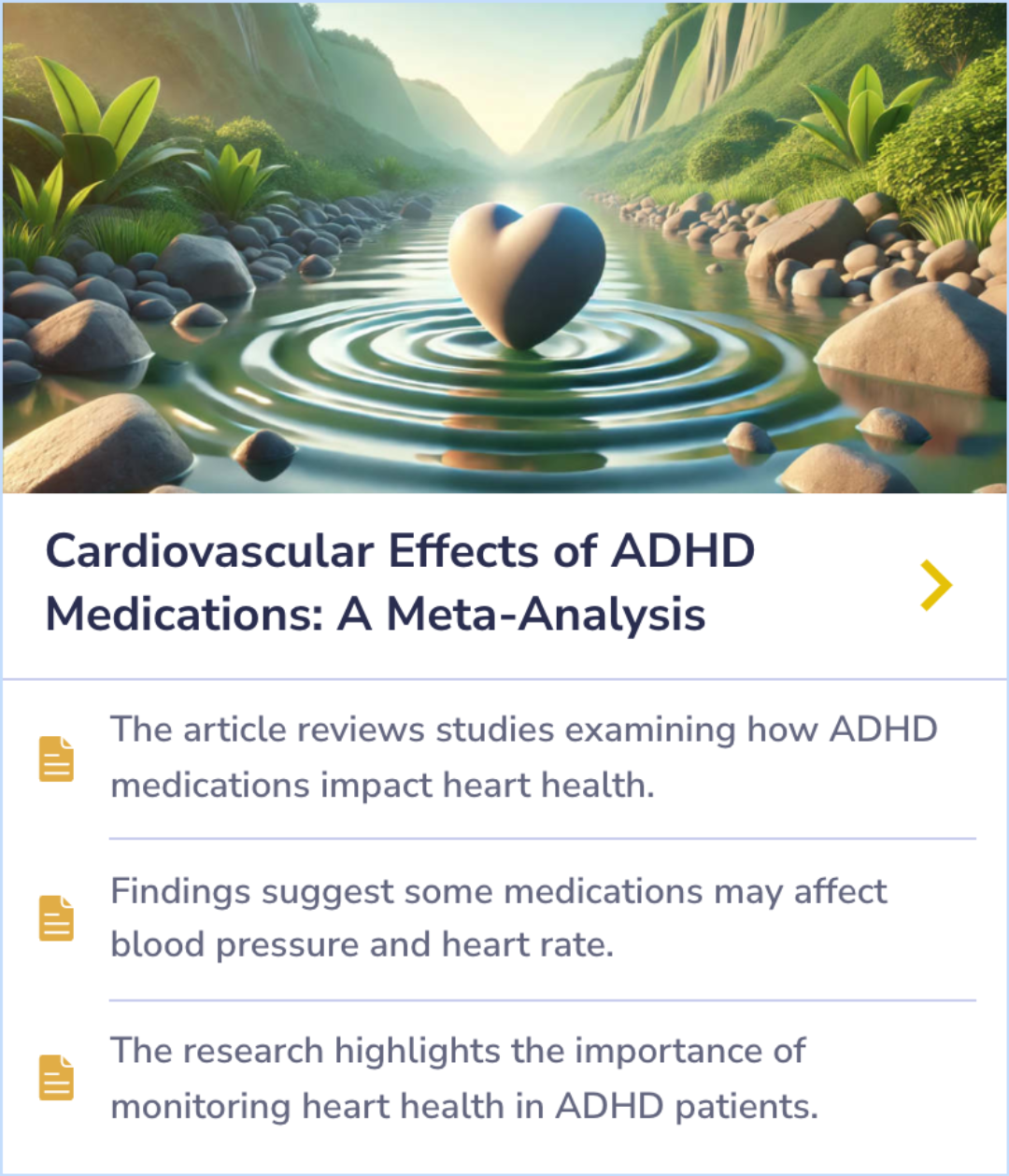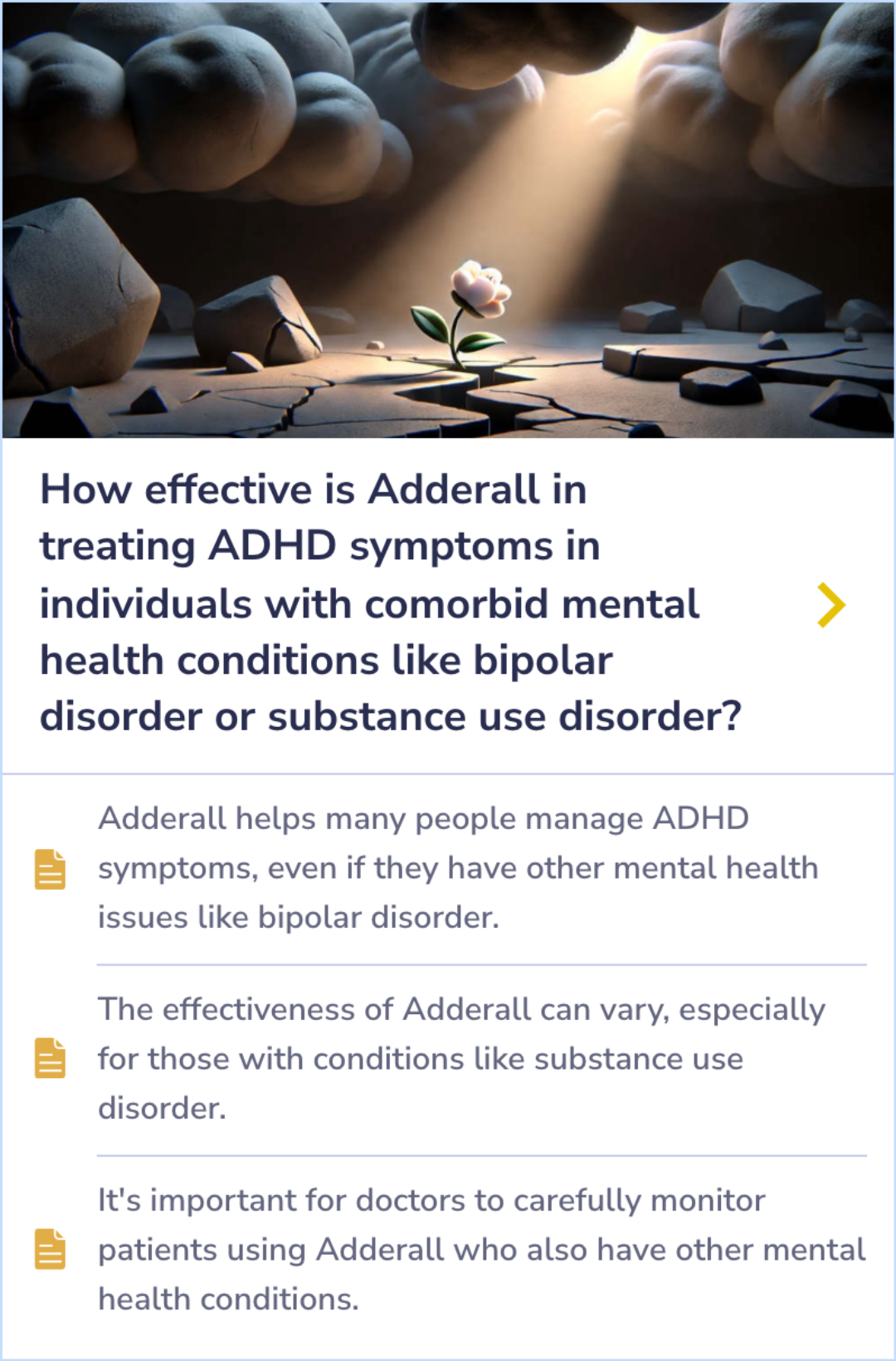Adderall
Evidence Based Answers
Adderall: Pros and Cons Overview
Adderall provides relief for ADHD-related symptoms but poses risks for heart health and may worsen psychiatric conditions in some cases.

Adderall aids ADHD symptoms but has heart and psychiatric risks.
Adderall: Effectiveness in Treating ADHD
Adderall has been shown to reduce symptoms of ADHD, such as inattention, impulsivity, and hyperactivity. This impact is noted in children, adolescents, and adults, often leading to quick improvements in focus and behavior.
Clinical trials have demonstrated that patients taking Adderall show greater symptom relief compared to those taking a placebo. However, results may differ, and it might not work equally well for everyone.
Clinical trials have demonstrated that patients taking Adderall show greater symptom relief compared to those taking a placebo. However, results may differ, and it might not work equally well for everyone.
“
Source Quotes:
Stimulant medications have been shown to offer symptomatic improvement (particularly in attention and on-task behaviors) as well as improvement in daily functioning (vocational and interpersonal performance) in adults as compared with placebo.
It is generally accepted that the efficacy of the amphetamines is not different from that of methylphenidate, which is the other major stimulant used to treat ADHD.
Adderall: Cardiovascular Risks
Adderall use can pose cardiovascular risks, especially for individuals with existing heart conditions. Possible effects include increased blood pressure and heart rate, and in rare cases, serious events such as heart attack or stroke.
Those with heart conditions should undergo careful cardiovascular assessments before starting Adderall, which may involve tests like electrocardiograms for some patients.
Those with heart conditions should undergo careful cardiovascular assessments before starting Adderall, which may involve tests like electrocardiograms for some patients.
“
Source Quotes:
Sudden deaths, stroke, and myocardial infarction have been reported in adults taking stimulant drugs at usual doses for ADHD.
Other adverse events evoked by the amphetamines include nausea, vomiting, abdominal cramps, increases in blood pressure and heart rate and possibly also the exacerbation of motor tics.
Adderall and Psychiatric Side Effects
Adderall may worsen symptoms in individuals with conditions like bipolar disorder or psychotic disorders. Reports include increased mania, hallucinations, or delusions in those with pre-existing conditions.
Rarely, stimulants can trigger psychotic symptoms in children or adolescents without a history of mental illness.
Rarely, stimulants can trigger psychotic symptoms in children or adolescents without a history of mental illness.
“
Source Quotes:
Some side effects can be serious. If you experience any of the following symptoms or those listed in the IMPORTANT WARNING section, call your doctor immediately or get emergency medical treatment: slow or difficult speech, dizziness, weakness or numbness of an arm or leg, seizures, motor or verbal tics, teeth grinding, depression, believing things that are not true, feeling unusually suspicious of others, hallucinating (seeing things or hearing voices that do not exist).
Occasional case reports indicate that prescription use can produce marked psychological adverse events, including stimulant-induced psychosis.,High doses of amphetamines can produce psychotic behavior indistinguishable from schizophrenia in asymptomatic schizophrenics and in some healthy human subjects.
Adderall: Common and Serious Side Effects
Common side effects of Adderall include insomnia, dry mouth, headache, and increased heart rate. For some users, these effects can range from mild to bothersome.
Serious cardiovascular events like heart attack or stroke may occur, particularly in individuals with heart issues. Medical attention should be sought if symptoms such as chest pain or fainting develop.
Serious cardiovascular events like heart attack or stroke may occur, particularly in individuals with heart issues. Medical attention should be sought if symptoms such as chest pain or fainting develop.
“
Source Quotes:
Most pharmaceutical amphetamine is used in treatment of ADHD. Although the therapeutic mode of action is not fully known, amphetamine is highly efficacious for the reduction of core ADHD symptoms in children, adolescents, and adults.
Other common side effects of amphetamine include insomnia, headache, dry mouth, tachycardia, increase in systolic blood pressure, restlessness, and irritability.
Key Takeaways
Conclusions
Adderall is recognized for its capacity to mitigate ADHD symptoms like inattention and hyperactivity, with quick improvements often seen across various age groups through clinical trials.
Yet, its use requires caution due to possible cardiovascular risks like increased blood pressure, particularly in those with prior heart conditions. Additionally, psychiatric side effects such as worsened mania or hallucinations in those with pre-existing conditions have been observed.
Yet, its use requires caution due to possible cardiovascular risks like increased blood pressure, particularly in those with prior heart conditions. Additionally, psychiatric side effects such as worsened mania or hallucinations in those with pre-existing conditions have been observed.

Evidence Summary
Exploring Adderall’s Potential Link to Future Substance Abuse
The article highlights the potential link between Adderall, a medication commonly prescribed for ADHD, and future substance abuse concerns. While Adderall can effectively manage ADHD symptoms, some studies question whether its use might increase the risk of substance-related problems down the line.
Research is examining whether individuals who use Adderall, especially over extended periods, may be more prone to challenges with substance use in the future.
Research is examining whether individuals who use Adderall, especially over extended periods, may be more prone to challenges with substance use in the future.
Evidence Summary
How ADHD Medications Affect Heart Health
ADHD medications can impact heart health, with research showing changes in blood pressure and heart rate in some cases. These medications may elevate or lower these measures, depending on factors like dosage and individual response.
Research emphasizes the need for regular cardiovascular monitoring in ADHD patients, as these adjustments can help manage any potential risks tied to medication use.
Research emphasizes the need for regular cardiovascular monitoring in ADHD patients, as these adjustments can help manage any potential risks tied to medication use.
Evidence Summary
Managing ADHD with Adderall and Coexisting Conditions
Adderall often helps people manage ADHD symptoms even when they have coexisting mental health issues like bipolar disorder. However, its effectiveness may differ for those with conditions like substance use disorder. Close supervision by a doctor is key to ensuring Adderall's safe use.
Monitoring is especially important when treating individuals with multiple mental health conditions to maximize benefits and minimize risks.
Monitoring is especially important when treating individuals with multiple mental health conditions to maximize benefits and minimize risks.


